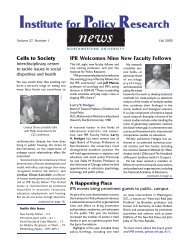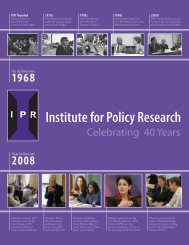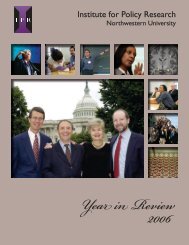Highlights of 2011 - Institute for Policy Research - Northwestern ...
Highlights of 2011 - Institute for Policy Research - Northwestern ...
Highlights of 2011 - Institute for Policy Research - Northwestern ...
You also want an ePaper? Increase the reach of your titles
YUMPU automatically turns print PDFs into web optimized ePapers that Google loves.
Quantitative Methods <strong>for</strong> <strong>Policy</strong> <strong>Research</strong><br />
the Spencer Dissertation Fellowship<br />
program. Their principal question in the<br />
evaluations was not whether those who<br />
received the fellowships had more successful<br />
careers than those who did not,<br />
but rather whether they had more successful<br />
careers because they received a<br />
fellowship. They also examined whether<br />
the Dissertation Fellowship program has<br />
helped to build a community <strong>of</strong> scholars<br />
related to the Spencer Foundation and<br />
whether there is any evidence that it<br />
has attracted scholars into education<br />
research. Using a regression discontinuity<br />
analysis, they examined the fellowships’<br />
impact on the total number <strong>of</strong> publications,<br />
citations, editorial positions, and<br />
grants received by fellows versus finalists<br />
who were not selected as fellows. Their<br />
findings indicated that both programs<br />
have a significant causal impact on several<br />
outcomes, especially in the fellows’ success<br />
garnering research support through<br />
both federal and nonfederal grants.<br />
University <strong>of</strong> Chicago methodologist Stephen Raudenbush unpacks a <strong>for</strong>mula <strong>for</strong> a<br />
multisite regression discontinuity design <strong>for</strong> a math curricular re<strong>for</strong>m program.<br />
Time-Sharing Experiments<br />
IPR sociologist Jeremy Freese and Penny Visser <strong>of</strong> the University<br />
<strong>of</strong> Chicago continue to expand the research capacity <strong>of</strong> Time-<br />
Sharing Experiments <strong>for</strong> the Social Sciences (TESS), a website<br />
that facilitates original experiments on nationally representative<br />
samples at no cost to investigators. Recently, TESS joined <strong>for</strong>ces<br />
with the Human Factors and Behavioral Sciences Division <strong>of</strong> the<br />
Department <strong>of</strong> Homeland Security’s Science and Technology<br />
Directorate to encourage survey research related to terrorism<br />
and government countermeasures. Specifically, the partnership<br />
will allow social and behavioral scientists to investigate the factors<br />
contributing to terrorism-related attitudes, beliefs, judgments,<br />
and behaviors with a field study larger than normally permitted<br />
in a standard TESS proposal. TESS was launched in 2008 as<br />
an infrastructure project <strong>of</strong> the National Science Foundation.<br />
Faculty, graduate students, and postdoctoral researchers can<br />
simply submit their proposals <strong>for</strong> peer review, and if successful,<br />
TESS then fields the Internet-based survey or experiment on a<br />
random sample <strong>of</strong> the U.S. population.<br />
Fostering a Methodological Network<br />
The Society <strong>for</strong> <strong>Research</strong> on Educational Effectiveness (SREE)<br />
gathered hundreds <strong>of</strong> researchers and educators from all<br />
over the nation in <strong>2011</strong> to participate in its first September<br />
conference, in addition to the organization’s annual conference<br />
in the spring. Several IPR members presented their research<br />
at the three-day meetings, both held in Washington, D.C.,<br />
including education economist David Figlio, Cook, and Hedges,<br />
who serves as SREE’s president. Founded in 2005, SREE is a<br />
pr<strong>of</strong>essional society that brings together scholars from a<br />
diversity <strong>of</strong> disciplines in the social sciences, behavioral sciences,<br />
and statistics who seek to advance and disseminate research<br />
on the causal effects <strong>of</strong> education interventions, practices,<br />
programs, and policies. It also publishes the Journal <strong>of</strong> <strong>Research</strong><br />
on Educational Effectiveness, a peer-reviewed publication<br />
<strong>of</strong> research articles focused on cause-and-effect relations<br />
important <strong>for</strong> education, which Hedges co-edits. SREE is<br />
supported by a grant from the <strong>Institute</strong> <strong>of</strong> Education Sciences.<br />
Methodologists Stimulate Q-Center<br />
Series<br />
Designed to showcase and promote discussion <strong>of</strong><br />
methodological innovation across disciplines, the Q-Center<br />
continued its colloquia series in <strong>2011</strong> with several renowned<br />
experts, including MDRC Chief Social Scientist Howard Bloom,<br />
who spoke about the design and analysis <strong>of</strong> a recent, largescale<br />
MDRC study <strong>of</strong> New York City’s small schools initiative.<br />
Stephen Raudenbush, who is Lewis-Sebring Distinguished<br />
Service Pr<strong>of</strong>essor at the University <strong>of</strong> Chicago, presented his<br />
research on the impact <strong>of</strong> a math curricular re<strong>for</strong>m program<br />
launched in 2004 by Chicago Public Schools on course-taking,<br />
classroom composition, and achievement. Andrew Gelman <strong>of</strong><br />
Columbia University and Kosuke Imai <strong>of</strong> Princeton University<br />
were among other invited speakers (see p. 72).<br />
53

















